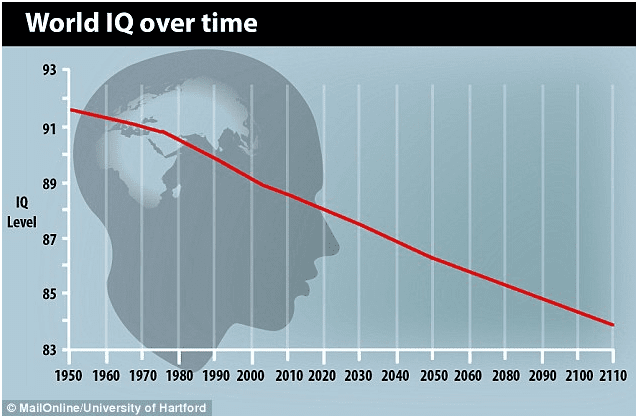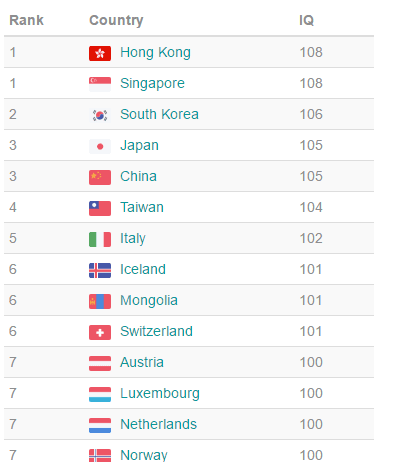
Mysteries of Intelligence: Are We Facing a ‘Low IQ’ Crisis?
Updated July 2023
In a world where knowledge is power and intellectual prowess is our compass through life’s labyrinth, the very idea of a potential ‘low IQ’ crisis sends shivers down the spine. Are we on the precipice of a cognitive cataclysm, or is there more to the story? Strap in because we’re about to embark on a thrilling journey through the annals of human intelligence.
The Flynn Effect: From the 1930s to the 1980s, the United States experienced a remarkable intellectual upswing, with the average IQ score soaring by three points. It’s as though the nation collectively decided to flex its cerebral muscles and reached new heights in problem-solving, reasoning, and innovation. But this phenomenon wasn’t exclusive to the U.S. – it reverberated globally, famously known as the ‘Flynn effect.’
The Rise of Intelligence: Imagine a world where every passing decade saw us become smarter, more capable, and poised for greatness. That’s precisely what the Flynn effect heralded, as it wasn’t just America basking in the glow of heightened IQs. Post-war Japan and Denmark, for instance, experienced similar cognitive booms, proving that the sky was the limit for the human intellect. The eponymous researcher James Flynn, hailing from the illustrious University of Otago, played a pivotal role in elucidating the reasons behind this profound surge in intelligence.
Unveiling the Secrets of the Flynn Effect: Flynn’s groundbreaking research suggested that the IQ boost wasn’t due to some miraculous genetic evolution but a profound transformation in our living conditions. Improved nutrition, access to quality education, and enhanced overall well-being were the unsung heroes of this IQ revolution. In essence, our environment catalysed the exponential growth in our cognitive abilities.
Let’s fast forward to the present day, leaving the ’80s era of three-point IQ gains behind. It’s a new world with new challenges, and some voices in the academic arena have started raising alarm bells. Are we, perhaps, witnessing a reversal of the Flynn effect? Is it possible that our ‘low IQ’ nightmares are inching closer to reality?
Intriguingly, a shift in the tides may be underway. Recent data, available up until December 2022, has left experts pondering the future of our intellectual potential. While we’re not suggesting a doomsday scenario is upon us, staying informed about the latest developments is vital.
Join us on this captivating journey as we delve into the evolving landscape of human intelligence. Let’s explore the current state of our cognitive abilities and understand if we’ve truly reached the zenith of our intellectual capabilities or if the Flynn effect might stage a comeback, guiding us towards a brighter, more brilliant future. Stay tuned for the latest insights and discoveries in human intelligence as we navigate through the complex web of ‘low IQ’ concerns and their implications in our ever-changing world.
In the grand tapestry of human intelligence, a puzzling thread has unravelled before our very eyes, and it’s a revelation that’s not for the faint-hearted. If you’ve ever wondered about the veracity of ‘low IQ’ concerns and how they intertwine with the modern world, then this is a tale you won’t want to miss.
The Startling Revelation: Picture this – a study fresh from the halls of the University of Amsterdam, published just last year, shook the foundations of our beliefs. It whispered a disquieting secret: Western populations have collectively witnessed a staggering 14 IQ points decline since the illustrious Victorian era. Hold on to your intellectual hats because this is where it gets intriguing.
The Controversial Connection: Enter Jan te Nijenhuis, a maverick in the world of intellect and a keen investigator of this profound paradox. He dared to venture into the realm of IQ and fertility, shining a spotlight on an issue that’s been whispered in hushed tones. The academically gifted among us might be playing a different game entirely. According to The Huffington Post, the notion that intelligent women have fewer children than their peers with different aspirations seems to be a recurring theme.
But, reader, allow us to steer you through the labyrinth of controversy. The link between IQ and fertility is far from a settled matter; it’s an enigma that still keeps scholars up at night. Are we staring at a potential ‘low IQ’ crisis, or is there more than meets the eye?
Fast forward to the present, where up-to-date data from December 2022 can paint a clearer picture of where we stand today. As we delve deeper into this fascinating territory, we’ll unearth the latest findings to keep you at the edge.
This is a story where facts blur into myths, and mysteries unveil themselves as truths. Join us as we journey through the complex interplay of intelligence and procreation, navigating the uncharted waters of ‘low IQ’ concerns in the modern era. It’s a tale of intrigue and curiosity, where the plot thickens with each revelation and where the answers are not always what they seem. Dare to dive into this captivating exploration of the human mind and its ever-evolving quest for brilliance and understanding.

Unveiling the Mind’s Stopwatch: The Intriguing Connection Between Reaction Times and ‘Low IQ’
In the ever-evolving saga of human intelligence, Dr. Nijenhuis is our fearless explorer, delving deep into the enigmatic realm of reaction times. Hold onto your intellectual seatbelts because we’re about to embark on a journey that could change how you perceive your mind’s inner workings.
The Time Traveler’s Chronicle: Dr. Nijenhuis, a maverick in the world of cognitive science, embarked on an ambitious quest to decode the mysteries of our evolving intellect. He scoured through the annals of history, analyzing 14 intelligence studies spanning 120 years, from 1884 to 2004. And what he discovered will leave you awestruck.
The Art of Measuring Speed: Imagine if there was a way to peer into the very heart of human cognition to see how quickly our minds process the world around us. Dr Nijenhuis used an ingenious method to do just that – reaction times. These are like the stopwatches of our minds, ticking away as we respond to stimuli. In this fascinating journey, we’ll learn how these reaction times are more than just a measure of speed; they’re the secret windows to our intellect.
The Astonishing Evolution: As Dr. Nijenhuis unraveled the data, a shocking revelation emerged. In the late 19th century, our visual reaction times were swift, averaging a mere 194 milliseconds. But here’s the jaw-dropping twist – by 2004, the times had expanded to an average of 275 milliseconds. That’s an astonishing leap in the blink of an eye! But what does it all mean?
You see, the correlation between reaction times and intelligence is a subject that continues to ignite debates and ignite curiosity. Is this significant extension in reaction times indicative of a looming low IQ dilemma? Or is it simply a symptom of our rapidly changing world?
We’ll traverse the intricacies of this revelation, armed with the most current data available, extending up to December 2022. The latest findings and insights await you as we venture into the uncharted territory of the human mind’s stopwatch.
Join us on this gripping odyssey through the corridors of cognitive science, where each discovery is a revelation, and each revelation is a potential key to understanding the mysteries of low IQ in our ever-shifting world. It’s a journey where science meets intrigue, where reaction times become storytellers, and where you, dear reader, become the avid explorer of your intellect.
Low IQ and the Flynn Effect
Experts suggest that the Flynn effect, observed in developed countries, might be showing signs of ending. Notably, IQ scores are not merely stabilizing but potentially declining. Noteworthy researchers, including Dr. Flynn, posit that enhanced education can reverse this trend. They also highlight that the apparent decline could be a temporary fluctuation. However, some scientists hold a less optimistic viewpoint.
A prevailing notion is that the Flynn effect might have concealed a deterioration in the genetic foundation of intelligence. In essence, as more individuals reached their full cognitive potential, the actual potential itself experienced a decline. In a contentious vein, some have suggested that this could be attributed to educated individuals opting to have fewer children, thereby shaping subsequent generations to be predominantly comprised of individuals with lower levels of intelligence. Full Story
Using the same dataset, a different author has arrived at a distinct conclusion (as shared below). We suspect that more factors are in play than solely the “white factor.” Concerns extend beyond ethnicity and into realms such as compromised food quality (akin to tainted food), impure water supplies, excessive antibiotic usage, and misuse of vaccinations. It’s worth contemplating a parallel scenario: skilled breeders wouldn’t pair a prized male stud with a weak female horse, as the odds of producing a winning offspring would be slim.
Despite recent media coverage (especially by the Daily Mail) presenting the drop in IQ levels as an enigmatic decline without easily identifiable causes, it’s evident that the diminishing IQ is intricately linked to significant immigration from Third World countries with generally lower IQs. The statistics indicate that IQ test results in countries like the UK, Denmark, and Australia have notably declined in just the past decade. Additionally, the average IQ of “Westerners” has plummeted by 10 points or more since 1900.
IQ’s in the UK
For instance, in the UK, a comparison between tests conducted in 1980 and 2008 revealed that the average 14-year-old exhibited a decline of two IQ points over the 28-year span. Furthermore, even the brighter adolescents who participated in the 2008 study demonstrated an average intelligence decrease of six IQ points when measured against their counterparts from nearly three decades earlier. These assessments didn’t uncover that, as of 2012, nonwhite British pupils constituted 27.1 per cent of the total in primary schools and 23.4 per cent in secondary schools. With this ongoing rate of reproduction, it’s projected that by 2030, individuals of nonwhite ethnicity will make up the majority of the population under the age of 21 in the UK. Full Story
It’s unclear whether this issue can be simplistically categorized as a “black and white” matter. I invite you to examine the chart provided below.

Source- https://iq-research.info/en/page/average-iq-by-country
The nations boasting the highest IQ scores are predominantly Asian. If we consider that the ethnic population in the top two countries is primarily Chinese, it could be reasonably inferred that, on the whole, the Chinese exhibit the highest IQ as a collective. This perspective somewhat diminishes the issue’s complexity beyond merely a “black and white” scenario. However, it doesn’t negate the possibility that interactions with individuals of different backgrounds could potentially impact a nation’s long-term IQ trajectory.
It’s worth noting that possessing the highest overall IQ doesn’t necessarily equate to having the most geniuses in every field. For instance, Chinese hackers may not be as competitive as their Russian counterparts in areas like computer hacking. A similar phenomenon applies to top mathematicians, physicists, and other specialized domains.
By logical extension, if the goal were to dilute the IQ of a nation, a strategy might involve pairing high-IQ individuals with those possessing lower IQs. While the intricacies of this topic extend beyond the scope of this publication, it certainly prompts contemplation.
Musk On the Public Schooling System
Musk doesn’t significantly emphasise whether his employees possess college degrees. He conveyed to Auto Bild in 2014 that an individual’s formal education isn’t his primary concern.
“He believes that not having a college degree or even a high school diploma is not necessarily an obstacle. While graduating from a reputable university could suggest the potential for greatness, it’s not an absolute,” Musk stated.
Musk has engaged in intriguing discussions about this topic on Twitter as well. Just last year, he responded to a tweet asserting that success in life hinges on obtaining a degree and attending schools like Harvard.
Musk countered, saying, “That’s not accurate. Schooling and education aren’t synonymous. I didn’t attend Harvard, yet many of those who work with me did.” Full Story
Originally published on February 10, 2017, this piece has undergone multiple updates over the years, with the most recent update completed in July 2023.
Other Stories of Interest
New Jersey Teachers: Soaring from the Frying Pan to the Fire










